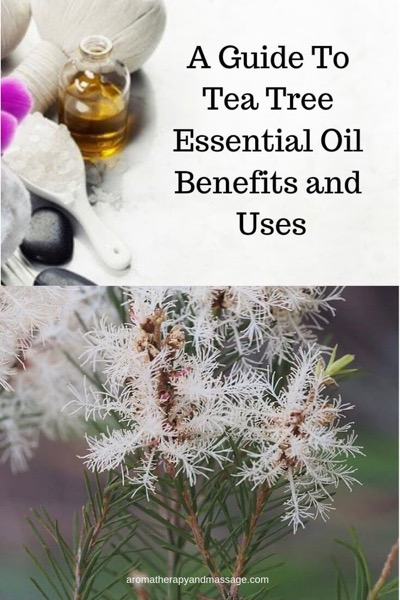- Home
- Essential Oil Profiles
- Tea Tree Essential Oil
As an affiliate for Bookshop, Amazon, and other programs, I may earn a small commission for products purchased through links. This doesn't affect the price you pay. Privacy policy and disclosures.
Search this site:
Guide to Tea Tree Essential Oil Benefits and Uses
Tea tree essential oil (Melaleuca alternifolia) is one of the most commonly used essential oils and is known as an all-purpose antiseptic. The fragrance promotes cleansing and purity.

An Australian study concluded tea tree oil is as effective as benzoyl peroxide in treating acne, with far fewer side effects. You can dab tea tree directly on a blemish, if you are not sensitive to the oil. Or dilute as needed or use in facial masks.
Basic Tea Tree Facts
Plant family: Myrtaceae
Production: Steam distilled from leaves and twigs of the tea tree (Melaleuca alternifolia).
Aroma: Fresh, sharp, medicinal.
Perfume/Aromatic note: Top to middle.
Is tea tree safe to use during pregnancy? Yes, according to Aromatherapy and Massage For Mother and Baby.
Is tea tree essential oil safe for children? Yes.
Cautions: Low risk of skin sensitization. A poor quality tea tree oil smells like melted rubber.
Main components:
- terpinen-4-ol 39.8%
- gamma-terpinene 20.1%
- alpha-terpinene 9.6%
Source: Essential Oil Safety, 2nd Ed.
Tea Tree Essential Oil Benefits
Aromatherapy: A Complete Guide to the Healing Art: Use tea tree for oily skin and hair and to reduce dandruff and scalp dermatitis. This oil helps relieve acne, dermatitis, diaper rash, fungus, and warts. The aroma builds strength.
The Heart of Aromatherapy: You can use tea tree for daily skin care, to support the respiratory system, and to make natural cleaning blends. The oil can help clear mucous and congestion, ease sore throats and coughs, and calm inflammation. The scent encourages energy, focus, and optimism.
The Encyclopedia of Essential Oils
(updated edition): In addition to helping relieve acne and oily skin,
tea tree oil may help with fungus (such as athlete's foot, candida, and
ringworm), dandruff, cold sores, colds and flu, some respiratory
problems, insect bites, warts, and minor wounds.
Aromatherapy For Healing the Spirit: In Traditional Chinese Medicine, tea tree oil strengthens the Defensive-Qi and helps clear infections. The oil also reinforces the Lungs, Heart, and nervous system and can tonify Qi-energy. The scent "invigorates the Heart and Mind (Shen), uplifting the spirit and building confidence."
Aromatica: A Clinical Guide to Essential Oil Therapeutics, Volume I: Psychologically, tea tree oil mildly stimulates the mind and promotes alertness. Physically, the oil restores hypotonic/weak conditions and decongests congestive/damp conditions. In Traditional Chinese Medicine the essential function of tea tree is to tonify the Qi and Yin, clear empty heat, and strengthen the Shen.
- The rasa (taste) of tea tree is bitter, pungent, sweet; the vipaka (aftertaste) is sweet; and the virya (energy) is cooling and moisturizing. (Marma Points of Ayurveda says the rasa is bitter, pungent, astringent and the vipaka is pungent.)
- The oil balances vata, pitta, and kapha. (Marma Points of Ayurveda states that in excess the oil may stimulate pitta.)
- Tissues most affected by the oil are skin, nerves, and respiratory.
- Indications for this essential oil include abscess, acne, dermatitis, asthma, bronchitis, athlete's foot, candida and other fungus, and insect/spider/scorpion bites.
Marma Points of Ayurveda adds that he oil has has an affinity for the skin and is beneficial for many skin conditions but contraindicated for inflammatory conditions. The oil disinfects and fights bacteria, viruses, and fungus. Combining tea tree with neem oil creates powerful antiseptic properties for skin use.
The Essential Guide to Aromatherapy and Vibrational Healing: Spiritually, tea tree helps you download and process divine inspiration, healing light, and true wisdom. Mentally, using the essential oil with conscious intent can help you connect with incoming and outgoing wisdom, vibrations, and communication. Emotionally, the oil encourages expansiveness in experiencing the depth of your emotions.
Aromatherapy and Subtle Energy Techniques: Tea tree oil strengthens and invigorates. The oil is especially useful for the third chakra to promote confidence, personal integrity, and the ability to change.
Mixing Essential Oils for Magic: Tea tree is a strongly purifying oil. It supports physical and emotional healing, builds strength, fosters trust, increases confidence, enhances creativity, and helps you find balance in personal growth.
Tea Tree Essential Oil Uses and Blends
Uses for tea tree essential oil include adding it to homemade deodorants or DIY mouthwashes.
For minor cuts and scrapes, clean the wound with plain soap and water and then:
- Mix 1 drop tea tree oil into 1 teaspoon coconut oil.
- Apply a little of the blend to the injury and cover it with a bandage.
- Repeat once or twice daily until a scab forms.
Steam for Colds
When you feel a cold coming on, use this steam.
- 20 drops tea tree essential oil
- 20 drops black spruce essential oil
- 20 drops ravintsara essential oil
Make a stock blend by adding the essential oils to a 5-ml dropper bottle.
To use: Add 1 drop to a bowl of steaming water. With your eyes closed, inhale the steam, being careful of the heat. Repeat two or three times a day for a week. Stop for a few days, and then use the steam again for another week.
Source: Aromahead
Fungus
Tea tree oil is traditionally believed to fight fungus. Studies, including one published in the Journal of Antimicrobial Chemotherapy, support using the oil to get rid of fungus.
Fungus can infect the skin, causing reddish round patterns called ringworm (tinea). Ringworm can occur on the body, scalp, groin (jock itch), or feet (athlete's foot).
The easiest way to use tea tree oil for ringworm is to dab it directly onto the fungus. Tea tree is generally acknowledged as a safe oil to apply directly to the skin without dilution. However, it's a good idea to spot test first to make sure you are not sensitive to the essential oil. If in doubt, dilute tea tree in a carrier oil.
Tea tree oil can cause a slight burning sensation, so take care if using on sensitive areas and dilute as needed. Also, be sure to wash your hands after applying the oil, as fungus is easily spread to other parts of the body.
Tea Tree Foot Scrub
- 2 tablespoons sugar
- 2 tablespoons carrier oil
- 10 drops tea tree oil
Blend the sugar and oil in a 2-ounce glass jar. Stir in the essential oil. Use this scrub in the bath or shower (be careful of a slippery floor), or use it during a foot soak.
Nail Care Blend
For general care of your toes and feet:
- 10 drops tea tree essential oil
- 5 drops lavender essential oil
- 5 drops lemon essential oil
- 2 drops peppermint essential oil
- Jojoba or other carrier oil
- Blend the essential oils in a small, dark bottle.
- Dilute 5 drops of the blend in 1 teaspoon jojoba (or other carrier) oil.
- Massage the diluted blend around your toes and feet.
- Repeat as needed.
Source: The Complete Book of Essential Oils and Aromatherapy
Invigorating Body Butter
- 5 tablespoons shea butter
- 5 tablespoons mango butter
- 2 tablespoons jojoba oil
- 8 drops tea tree essential oil
- 8 drops rosemary essential oil
- If necessary, soften the shea and mango butters.
- Place all ingredients in a mixing bowl.
- Use a whisk or hand blender to thoroughly combine ingredients until smooth.
- Store the body butter in a tightly sealed container in a cool, dry place for up to 6 months.
- Apply to skin as desired.
Adapted from New Directions Aromatics
Tea Tree Essential Oil Blends for Cleaning
Because tea tree is unfriendly to bacteria, viruses, and mildrew, the essential oil is great for making homemade cleaning products.
All-Purpose Cleaning Spray
Mix the following ingredients in a spray bottle:
- 2 cups filtered or distilled water
- 1 cup white vinegar
- 10 to 12 drops tea tree oil
- 5 to 10 drops of lemon essential oil
Shake well before use.
Natural Bathroom Scrub
Mix these ingredients in a container:
- 1/4 cup baking soda
- 1.5 teaspoons castile soap
- 12 drops tea tree essential oil
- 8 drops lemongrass essential oil
Use as you would any other bathroom scrub. Store covered in dry, dark place.
Buy essential oils from Aromatics International (recommended).
Rocky Mountain Essential Oils.
Photo Credit: Geoff Derrin [CC BY-SA 4.0], via Wikimedia Commons



